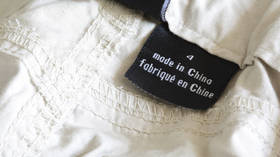
Apparel and footwear manufacturers have met challenges in finding alternative production hubs

© Getty Images / RobMattingley
Global garment and footwear producers are facing challenges with shifting supply chains out of China, Bloomberg reported earlier this week, citing several apparel makers and factory owners.
Most have faced difficulties finding alternative production hubs, with some even moving back to the mainland, having reversed their plans due to growing economic uncertainties across the world and sluggish consumer demand.
According to Laura Magill, the global head of sustainability at footwear brand Bata Group, the mature ecosystem developed in China over decades ensures competitive price points and delivers stable quality at large-scale manufacturing that’s “hard to copy” somewhere else.
Earlier this year, various media outlets reported that fashion companies from the US and the EU began rethinking their decades-old dependence on factories in China and stopped listing the country as their top supplier due to growing diplomatic uncertainty amid Washington’s trade war with Beijing.

Some producers reportedly moved production lines to Vietnam, Bangladesh, India, Türkiye, and Portugal.
Lin Feng, who owns apparel factories in and around China’s Guangzhou, told Bloomberg that he had launched a new production line for ladies’ dresses in Hanoi to “test the waters” in 2020.
However, the businessman failed to benefit from the move despite salaries twice less than those he pays in Guangzhou, as the number of orders from wary overseas customers significantly dropped. He exited Vietnam and shifted his focus back to Guangzhou in 2022, as his plants manufacture clothes primarily for US and European clients.
“There’s no point talking about expansion or overseas shifts now,” Lin said. “With weak demand, low labor costs and tariff exemptions are meaningless.”
For more stories on economy & finance visit RT’s business section




